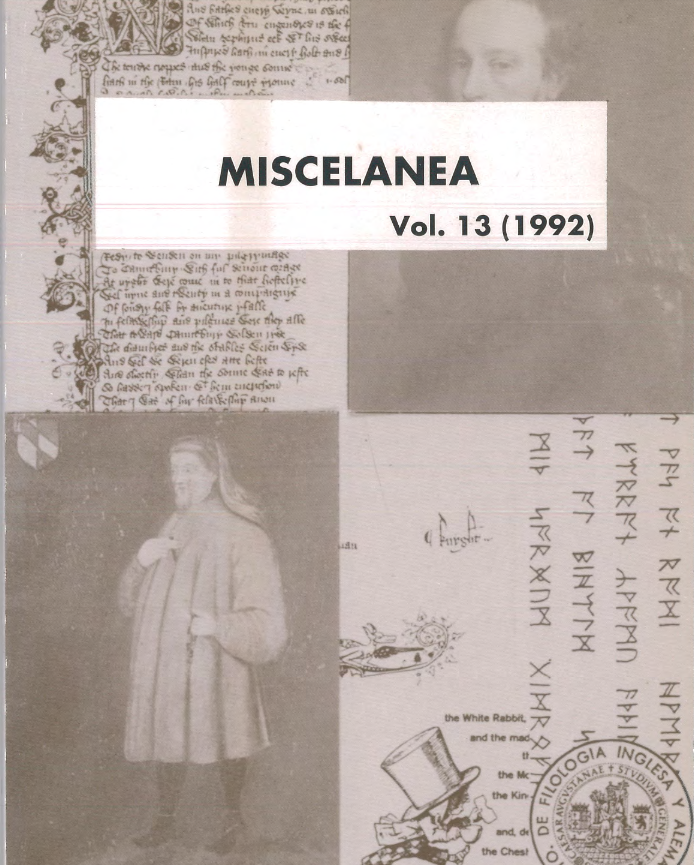The Role of Epistemic Modality in English Politeness Strategies
DOI:
https://doi.org/10.26754/ojs_misc/mj.199211795Abstract
The number of recent linguistics works on politeness has given evidence that this feature accounts for the way language is used to a greater extent than it would seem at first sight. This paper will prove the pervasive influence of politeness on epistemic modality, that is, the kind of modality which concerns judgements about the truth of the propositional content of an utterance. I shall adopt Brown and Levinson’s [1987] approach to politeness strategies in terms of ‘face’, ‘positive politeness'and ‘negative politeness’ —notions which will be made clear in the paper. The most obvious conclusions drawn from this analysis are 1) that expressions of uncertainty are used as politeness strategies both in directives (to soften the speaker's imposition on the hearer), and in statements (to avoid full commitment to the truth of the proposition); and 2) that expressions which emphasize the speaker's certainty about the truth of the proposition tend to highlight the speaker's concern about the hearer’s wishes or interests. Nevertheless, this analysis does not exclude other frequent patterns of the use of epistemic expressions as politeness devices, such as the cases of apologies, answers to invitations, and contradictions.
Display downloads
References
BROWN, P:, and S. C. LEVINSON. 1987. ‘Politeness: Some Universals in Language Usage. Cambridge: Cambridge UP. DOI: https://doi.org/10.1017/CBO9780511813085
CARRETERO, M: 1991. “Una propuesta de tipología de la modalidad: la aceptación como categoría modal.” Dicenda 10 {Forthcoming}.
CHAFE, W.L 1986. “Evidentiality in Conversation and Academic Writing.” In 1 Chafe and Nichols 1986: 261-272.
CHAFE, W. L., and J. NICHOLS, evs. 1986. Evidentiohty: The Linguistic Coding of Epistemology. Norwood (NJ): Ablex.
COATES, J..1987. “Epistemic Modality. and Spoken Discourse.” In Transactions of the Philological Society: 110-131. DOI: https://doi.org/10.1111/j.1467-968X.1987.tb00714.x
COATES, J. 1988. “Gossip revisited: language in all female groups. ” In Coates and Cameron 1988: 94-122.
COATES, J., and D. CAMERON, eds. 1988. Women in Their Speech Communities, London: Longman.
CORUM, C. 1975. “A Pragmatic Analysis of Parenthetic Adjuncts.” In Papers from the Eleventh Regional Meeting of the Chicago Linguistic Society 11:133-141.
COULMAS, F., ed. 1981. Conversational Routine. The Hague: Mouton.
FRASER, B. 1981. “On Apologizing,” in Coulmas 1981: 259-271. DOI: https://doi.org/10.1007/978-1-4615-7228-2_16
GIVON, T. 1990. Syntax: A Functional: Typologica Introduction. Vol. ll. Amsterdam: John Benjamins.
HALLIDAY, M. A. K. 1985. An Introduction to Functional Grammar. London: Edward Arnold.
HOUSE, J. 8-KASPER, G. 1981. “Politeness Markers in English and German." In Coulmas 1981: 157-185. DOI: https://doi.org/10.1515/9783110809145.157
KELLER, E. 1981. “Gambits: Conversational Strategy Signals." In Coulmas 19817 93-113. DOI: https://doi.org/10.1515/9783110809145.93
LAKOFF, R. 1973. “The Logic of Politeness; or, Minding Your P's and Q's.” In Papers from the Ninth Regional Meeting of the Chicago Linguistic Society 9: 292- 305.
LEECH, G. 1983. Principles of Pragmatics: London: Longman.
LEVINSON, S.C. 1983. Pragmatics. Cambridge: Cambridge UP. DOI: https://doi.org/10.1017/CBO9780511813313
WOODS, E., and N. MclLEOD. 1990. Using English Grammar. London: Prentice Hall.
Downloads
Published
Issue
Section
License
Copyright (c) 1992 Marta Carretero

This work is licensed under a Creative Commons Attribution-NonCommercial 4.0 International License.


